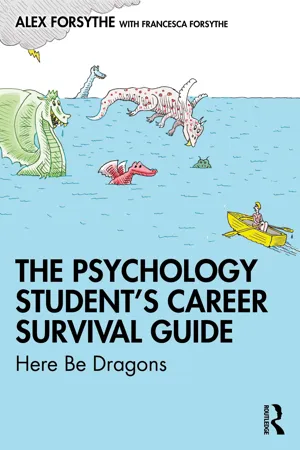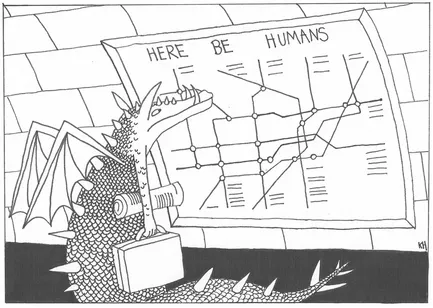
- 222 pages
- English
- ePUB (mobile friendly)
- Available on iOS & Android
About this book
The Psychology Student's Career Survival Guide is designed to aid students in identifying their ideal career pathway and imbue them with the right tools and skills to not only achieve their desired job but to progress and thrive within the workplace.
The first half of the book focuses on how to find and get a suitable job. The remaining chapters explore gaining success in the workplace in terms of personal growth, navigating criticism, workplace relations and the critical job assignments that every graduate should pursue. Forsythe, an experienced organisational psychologist, helps students recognise and apply the acquired psychological skill set to develop a personal brand, increase personal visibility and develop professional networks. This smooths the transition from university into the world of work by developing effective working practices that will support personal performance and that of the workplace. This book can also serve as a practical guide for academics looking to bridge the gap between the developing student at university and demands of their future employers. It explicitly calls for vocational elements such as communication, team-working, goal setting and planning within the curriculum.
This engaging book comes with an abundance of resources to support students' individual development and to help academics run workshops. These resources include tool kits which include self-diagnostic tools and strengths finders, networking skill development, job search strategies, difficult interview questions, personal branding and so on. This is an essential text for psychology students at all levels looking for employability guidance and for psychology academics who are seeking supportive resources and guidance on helping students achieve their career ambitions.
Frequently asked questions
- Essential is ideal for learners and professionals who enjoy exploring a wide range of subjects. Access the Essential Library with 800,000+ trusted titles and best-sellers across business, personal growth, and the humanities. Includes unlimited reading time and Standard Read Aloud voice.
- Complete: Perfect for advanced learners and researchers needing full, unrestricted access. Unlock 1.4M+ books across hundreds of subjects, including academic and specialized titles. The Complete Plan also includes advanced features like Premium Read Aloud and Research Assistant.
Please note we cannot support devices running on iOS 13 and Android 7 or earlier. Learn more about using the app.
Information
Chapter 1 Here be dragons

- Purgatory
- Witches
- Plague
- The big bad wolf
- The living
- The dead
- The undead
- Fairies and elves
- Little girls with blond hair and a penchant for porridge
- Black cats
- Broken mirrors
- Horseshoes the wrong way up
- Horseshoes the right way up
- The colour black
- The colour orange
- The colour orange masquerading as ‘the new black’
- Sea monsters
- Mermaids
Knowing what we want is a rare psychological achievement
Managing ambiguity
Calm your inner chatter
- The need for certainty will almost certainly change depending on the situation. Learn to know when you need more certainty in your life and monitor your certainty-seeking behaviour by keeping a record of your mood and behaviours. Note when you are craving more certainty in your life and the behaviours triggered. What were the responses to those behaviours?
- Apps such as Headspace (www.headspace.com/) can help you manage ‘inner chatter’, relax and engage more with the uncertainties of life.
Remove the stick from your bum
- Do not always choose news that fits your views. There is profound value in reading information that you disagree with, because it develops your perspective by providing new knowledge and understanding. For example, join a network social media group that you fundamentally disagree with (political parties you would never vote for, lifestyles you would never want to live – the flat earth society is one of my favourites – pro-life, pro-choice, gun ownership). Thanks to social media and the internet, you can comfortably and safely walk a mile in someone else’s shoes (or jackboots). It’s not necessary to shave your head, don the aforementioned boots and have a swastika tattooed on your forehead – and it’s a lot safer not to – but you can listen to or read viewpoints from that side of the road which you would normally never venture to.
Table of contents
- Cover
- Half Title
- Title Page
- Copyright Page
- Dedication
- Contents
- Introduction
- 1 Here be dragons
- 2 My psychology DNA
- 3 Tell me what you want, what you really, really want?
- 4 Your personal brand
- 5 From applications to interviews that win
- 6 Starting work
- 7 Good relationships at work
- 8 Influence and persuasion
- 9 Chart your own course and set sail!
- Index